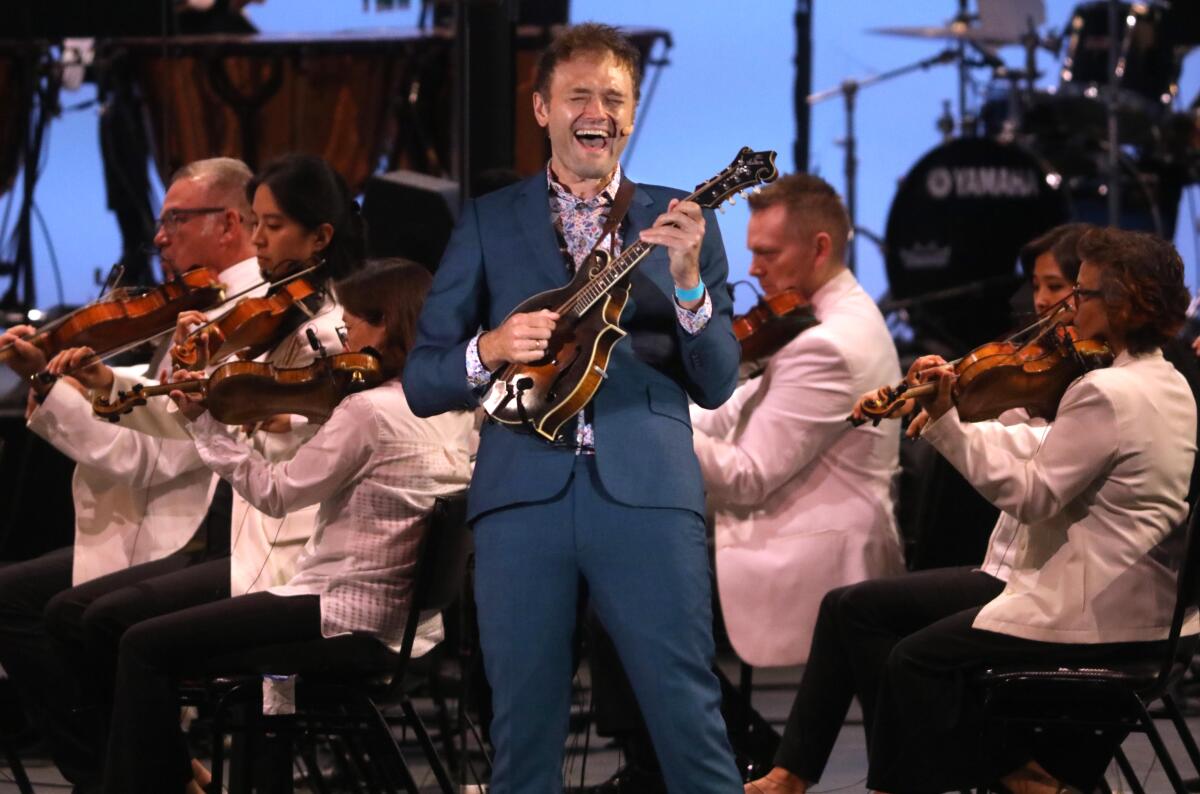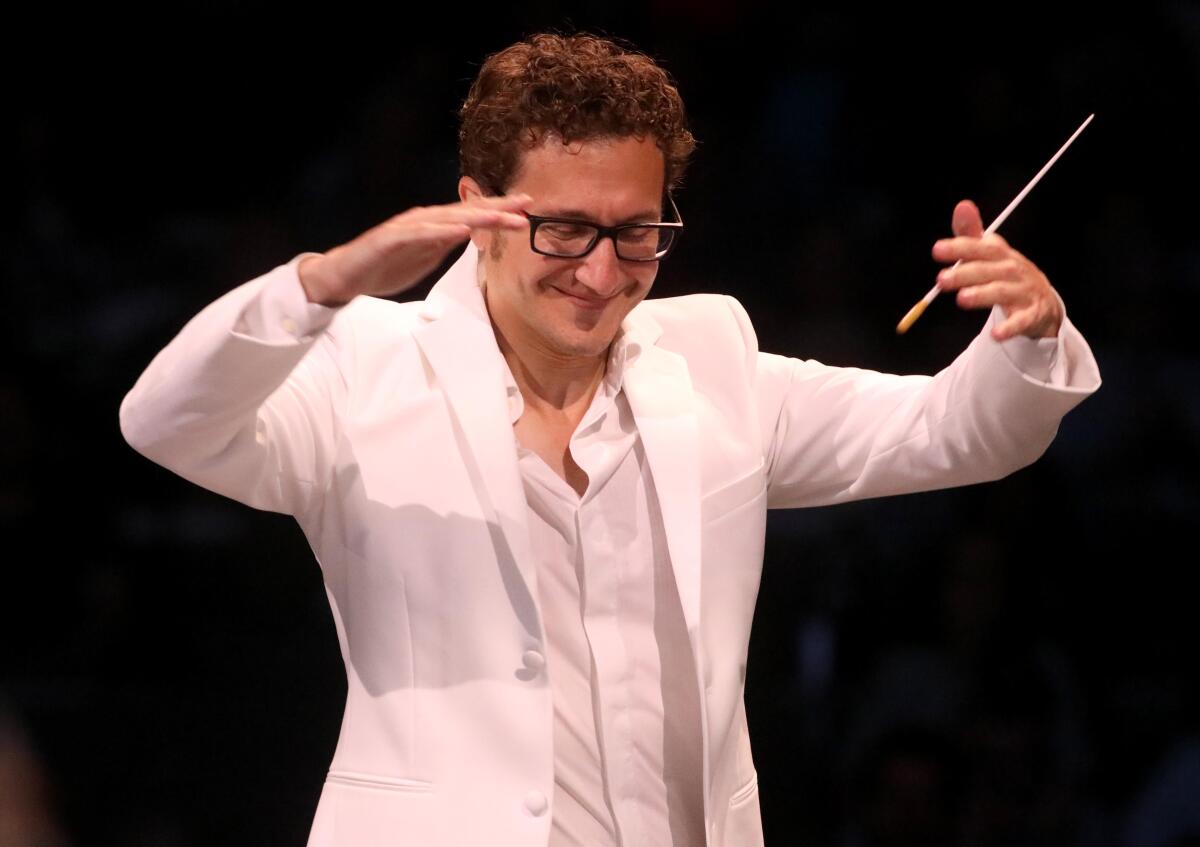Review: Singing and rambling, Chris Thile calls for ‘Attention!’ with his shape-shifting mandolin

- Share via
When it comes to provocatively suggestive titles, composers’ intentions are seldom as successfully realized as with, say, Scriabin’s “Poem of Ecstasy” or P.D.Q. Bach’s affectionate Philip Glass parody, “Einstein on the Fritz.” Yet, in the case of Copland’s beloved “Appalachian Spring,” which closed the Los Angeles Philharmonic Hollywood Bowl program Tuesday night, the composer was ever bemused by audience members who, at various times, would say to him how vividly the ballet score evoked the mountain air and scents of Appalachia in the spring.
Copland had had no such effects in mind while writing the score in Hollywood in during World War II. It was simply a ballet for Martha Graham, who set it in an unspecified Shaker Village and only afterwards chose “Appalachian Spring” as a title.
But the first half of Tuesday’s program happened to be the West Coast premiere of a new mandolin concerto with a wacky title. And leave it to an extroverted, stellar and spectacular mandolinist to have already lived up to that title by walking on stage. That’s not quite right. Chris Thile didn’t walk, he kind of ran, kind of floated, excitedly kicking his heels.
The full title of the concerto is “Attention! A narrative song cycle for extroverted mandolin and orchestra.” The program book gave it a timing of 42 minutes. It was longer. Of course, it was. Attention-getting goes without saying.
Throughout the performance, Thile plays his mandolin nonstop with, and sometimes against, the orchestra. But “Attention!” is not really a concerto. Thile sings much of the time, but this is hardly a formal song cycle either. Songs don’t seem to begin or end but naturally emerge from the narration such that singing and speaking are one. Who knows what this is? Call it a ramble.
Ramble Thile does. And noodle. And fool around. He makes us laugh. He has a sentimental side, and a snarky one. His narration is all over the map and often incoherent. This is not the Thile who can make Bach arresting on the mandolin but rather turns more to his, and the mandolin’s, bluegrass roots as well as jazz. “Attention!” little resembles Thile’s more classical, earlier mandolin concerto performed by the Los Angeles Chamber Orchestra in 2010. That program coincidentally (or maybe not) also featured “Appalachian Spring.”
The essence of “Appalachian Spring” is to suggest renewal for an America in crisis through leading a simple life, a return to basics. In traditional Appalachian music, ballads and fiddle tunes, and many different kinds of music from Africa and Europe, were given new and different dimensions. The mandolin played a role. Thile takes that a big step further, making the mandolin an outright shape-shifter.
Born in Oceanside, Thile discovered bluegrass when he was 2 at a local pizza parlor. His family moved to the mountains (Idyllwild) when he was 4, and a decade later made their way to Kentucky. All of that percolates throughout the four sections of “Attention!”
First, though, Thile said that he thought he’d sing a Pete Seeger folk song, “Little Birdie.” Once the concerto began, he stopped to tune and started over. Then he did that again. Joked. Told us about meeting his idol, Carrie Fisher, at a bar in San Diego when he was 24. Cue “Star Wars” from the orchestra. There was a joke about a toilet plunger microphone that went by too fast.
In the following stream-of-consciousness sections, this, that and the next thing flew by, peppered by something or other in the orchestra. True to his San Diegan roots, Thile asked for an IPA, which he sipped and handed to the evening’s conductor, Teddy Abrams, who took a swig. “Carrie Freaking Fisher” became a refrain, and Thile played “Princess Leia’s Theme” on the mandolin with uncanny beauty. The Bowl is home to John Williams and “Star Wars,” but this was something new. When a violin/mandolin duel with associate concertmaster Bing Wang ensued, the violinist dazzled.

What the orchestra was up to proved hard to gauge. Thile got all the attention, be it from the amplification, his exceptional mandolin playing, his antic singing, his prancing, his distracted stor telling. Even so, stuff did happen with the orchestra, and that appeared to stoke Thile. Abrams kept busy. A distracted listener surely missed much.
Thile ended with a refrain of “Little Birdie,” this time as a singalong and returning repeatedly to the lyric, “I’ve a short time to be here/ And a long time to be gone.” Just like in life, madcap morphed movingly into startlingly profound melancholy.
The consoling encore was Bob Dylan’s “Don’t Think Twice, It’s All Right.” Think twice, though, and what comes to mind is Dylan’s “Ballad of a Thin Man” lyric: “Something is happening here/ But you don’t know what it is/ Do you Mr. Jones?” “Attention!” is a “Thin Man” concerto.
Abrams didn’t let go of that deeper mood in the second half of the program, which began with the world premiere of Jonathan Bailey Holland’s “The Comfort of Asymmetry.” Again, a title to consider. A clock ticks, with the help of a sparkling percussion section, just a little bit off. The orchestra is awash in drones and sweet chords, lending a spiritual awe. The music is with us only a short time (five minutes) yet cares not for the clock.
Abrams happens to be one of the more exciting young American music directors. He is doing wonders with the Louisville Orchestra and is an intriguing composer in his own right. His recent Piano Concerto written for Yuja Wang, newly recordedis, in its way, elatedly all over the map.
He conducted Copland’s suite from “Appalachian Spring” with a decided spring in his step. The lively rhythmic sections had more ferocity than usual, a reminder of Copland’s original purpose.
The five variations on the Shaker hymn “Simple Gifts,” for which the score is best known, helped put Thile’s “Little Birdie” return to simplicity ethos in perspective. The serene opening and close of “Appalachian Spring” became pure magic. Seldom do attention-seeking Bowl concerts end by asking us to importantly turn our attention inward.
More to Read
The biggest entertainment stories
Get our big stories about Hollywood, film, television, music, arts, culture and more right in your inbox as soon as they publish.
You may occasionally receive promotional content from the Los Angeles Times.











